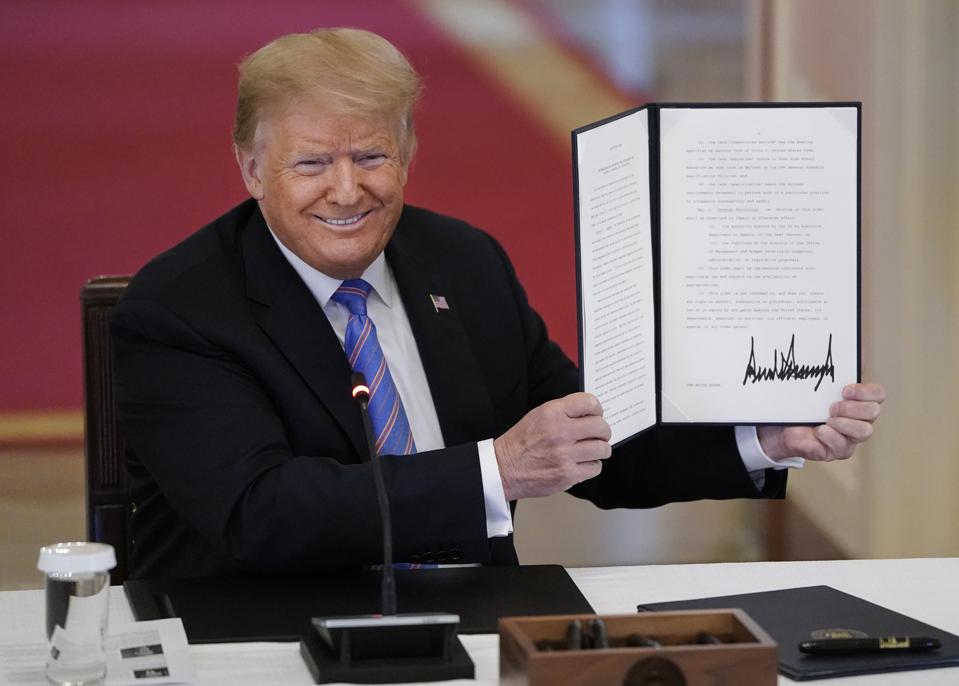- Like
- SHARE
- Digg
- Del
- Tumblr
- VKontakte
- Flattr
- Buffer
- Love This
- Save
- Odnoklassniki
- Meneame
- Blogger
- Amazon
- Yahoo Mail
- Gmail
- AOL
- Newsvine
- HackerNews
- Evernote
- MySpace
- Mail.ru
- Viadeo
- Line
- Comments
- Yummly
- SMS
- Viber
- Telegram
- JOIN
- Skype
- Facebook Messenger
- Kakao
- LiveJournal
- Yammer
- Edgar
- Fintel
- Mix
- Instapaper
- Copy Link

President Donald Trump (Photo by Drew Angerer/Getty Images)
Getty Images
President Donald Trump paused student loans for one more month.
Here’s what you need to know—and what it means for your student loans.
Student Loans
In an unexpected move, Trump has paused federal student loan payments for one more month until January 31, 2021. This means that the existing student loan relief will not expire on December 31, 2020 as previously expected. Therefore, student loan borrowers can continue to expect the following for their federal student loans:
- No payments: federal student loan payments are paused.
- No interest: no new interest will accrue on your federal student loan balance.
- No debt collection: Student loan debt collection of defaulted student loan debt is halted.
Private student loans, FFELP Loans or Perkins Loans do not qualify for the payment pause or other student loan relief from the Cares Act. During the payment pause, student loan borrowers can still pay their federal student loans if they choose.
“The coronavirus pandemic has presented challenges for many students and borrowers, and this temporary pause in payments will help those who have been impacted,” U.S. Secretary of Education Betsy DeVos said. “The added time also allows Congress to do its job and determine what measures it believes are necessary and appropriate.”
Why extend the payment pause for student loans?
In March, Congress passed the Cares Act, which temporarily suspended payments on federal student loans through September 30, 2020. Trump extended the moratorium on federal student loan payments through December 31, 2020. If this moratorium lapsed on December 31, it could potentially cause major headaches for student loan borrowers and student loan servicers alike. Why? President-Elect Joe Biden may extend the moratorium following his inauguration on January 20, 2021. If the moratorium hypothetically ended on December 31, 2020 student loan borrowers conceivably would pay student loans from January 1, 2021 to January 20, 2021, for example, and then potentially have their student loan payments paused again (if Biden decides to pause payments on the day of his inauguration). Further, it gets more complicated if Biden paused payments retroactively to January 1, 2021. Student loan servicers also may not be able to manage the on and off again payment pause process, let alone notify all borrowers of the payment pause. Therefore, by extending the student loan payment pause until after Biden’s inauguration, this decision effectively transfers the decision to the Biden administration. As a result, student loan borrowers will not have to worry about making payments between now and Biden’s inauguration.
DeVos: Congress is in charge of student loans
One big takeaway from today’s payment pause is a statement from DeVos, which has implications for any future plan to cancel student loans. “The Congress, not the Executive Branch, is in charge of student loan policy,” DeVos said. This has important implications if Biden tries to cancel student loans through an executive order. DeVos, as Education Secretary, says that Congress controls student loans and associated student loan policy. Implicitly, this includes student loan forgiveness. Sen. Elizabeth Warren (D-MA) and Senate Minority Leader Chuck Schumer (D-NY) have called on Biden to cancel student loans through executive order. Traditionally, Congress controls federal spending and would need to authorize widespread student loan forgiveness. Warren believes that the Higher Education Act of 1965 grants power to the Education Secretary to cancel student loans. (You can read more about whether a president can cancel student loans.) DeVos disagrees with the notion of cancelling student loans for all student loan borrowers, and said today that Congress, not the president, controls student loan policy. That said, the president can take certain action through executive order, as Trump has done with extending student loan relief from the Cares Act (which Congress duly passed).
Why not pause student loans longer?
Advocates and members of Congress have proposed various measures to extend the student loan payment pause, ranging from March 31, 2021 to September 30, 2021. However, opponents of extending the payment pause cite several reasons why it should not be extended, including:
- Cost: The cost is borne by federal taxpayers
- Fairness: two-thirds of adult Americans don’t have student loans or didn’t go to college and therefore would continue to subsidize one-third of the population
- Too Broad: the payment pause is available to everyone, rather than being targeted to student loan borrowers who are struggling economically
- Current Length: Through January 31, 2021, federal student loan payments will have been paused for nearly one year.
- Existing student loan relief: Student loan borrowers can access existing student loan relief through income-driven repayment plans, which help struggling borrowers to lower their monthly student loan payments to as low as $0 per month
Pay Off Student Loans
It’s unclear whether Biden will decide to pause payments on student loans beyond January 31, 2021, or if Congress or he decides to cancel student loans. Make sure you have a game plan to pay off student loans now. Here are 3 ways to help pay off student loans, all of which have no fees:


